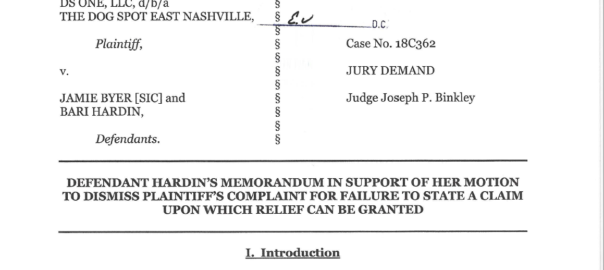Yesterday morning, the Nashville Post reported on yet another baseless, multimillion dollar defamation lawsuit filed here in Nashville. The lawsuit follows a series of other recent defamation actions—including since-dismissed attempts to silence dog lovers, supposed media sources, and others—that have been aimed at stifling legitimate public criticism.
It should be emphasized that the overwhelming majority of such lawsuits have no realistic chance of success in a court of law. Disturbingly, however, regardless of their legally meritless nature, such lawsuits often achieve their intended result—censorship of critical commentary and criticism of the powerful in particular—anyway. Because, all things being equal, people would prefer not to be sued, voluntary self-censorship can be all-too-appealing. Thus, to prevent such societal harm, it is long past time that Tennessee adopted a meaningful Anti-SLAPP law to deter would-be censors from threatening those who lawfully exercise their fundamental right to speak freely.
Though its protections are commonly taken for granted, the First Amendment to the United States Constitution codifies the most important protection in America’s governing charter. Chief among the rights guaranteed by the First Amendment is the proscription against government action that “abridg[es] the freedom of speech.” Uncontroversially, the right to speak freely plays an indispensable role in enabling the free exchange of thoughts, information, and ideas. Indeed, without such a right, democratic government would not be possible at all. If unaccompanied by the right to speak freely and critically, for example, “free and fair” elections would quickly become unrecognizable.
When it comes to defamation lawsuits, the First Amendment affords citizens enormous protection. In practice, however, exercising one’s constitutional right to criticize the powerful can result in ruinous financial consequences.
The ability to sue people for defamation (libel in published form, slander by spoken word) or any number of other speech-related torts—like false light invasion of privacy—operate as theoretically narrow exceptions to the broad rule that speech is not illegal. As a practical matter, however, most people cannot afford the tens (if not hundreds) of thousands of dollars in legal fees that are necessary to defend oneself against even the most frivolous defamation claims. Nor are most people willing to endure the years of terror and stress that commonly accompany litigation. As a consequence, in practice, these theoretically narrow exceptions provide enormous space for the powerful and well-resourced to threaten, censor, abuse, and intimidate those who lack the means, knowledge, or fortitude to defend themselves. Further, when media outlets puff up defamation lawsuits and hype the liability that defendants are facing at the outset of a case regardless of legitimacy—but then fail to follow up after a lawsuit predictably collapses—all that viewers learn is that criticizing powerful people is dangerous.
None of this, of course, is meant to suggest that all defamation lawsuits are meritless. In the 1966 case Rosenblatt v. Baer, U.S. Supreme Court Justice Potter Stewart persuasively observed that: “The right of a man to the protection of his own reputation from unjustified invasion and wrongful hurt reflects no more than our basic concept of the essential dignity and worth of every human being—a concept at the root of any decent system of ordered liberty.” This worldview still carries widespread acceptance. Accordingly, even the most ardent defenders of the First Amendment support defamation claims where, for example, someone falsely accuses an innocent child of being a murderer. Indeed, even this author has filed a defamation suit to protect the reputation of an individual who was subjected to fabricated claims (on national television) of being a rapist and a thief by a woman who had had him kidnapped, tortured and very nearly killed—a lawsuit that ultimately resulted in an admission that the allegations were baseless.
Despite their frequency, however, legitimate defamation suits are few and far between. Accordingly, the overwhelming majority of people who are sued for defamation are subjected to potential liability for lawfully exercising a constitutional right. Further, because the First Amendment values not only the right to speak, but also the right to hear and the right to receive information, when individuals are censored, society as a whole suffers.
To deter such harm, many states have adopted “Anti-SLAPP” laws, which afford people who are sued for defamation special protections in response to “Strategic Lawsuits Against Public Participation.” Although the substance of such laws varies across jurisdictions, they frequently contain provisions requiring mandatory payment of attorney’s fees in the event of a successful defense; an expedited process for reviewing the legitimacy of a plaintiff’s lawsuit; and/or an automatic right to appeal early on in the proceedings.
Tennessee, for its part, has a limited Anti-SLAPP law that provides for the payment of attorney’s fees when a person is improperly sued for exercising “such person’s right of free speech or petition under the Tennessee or United States Constitution in connection with a public or governmental issue,” and when the person sued has “communicate[d] information regarding another person or entity to any agency of the federal, state or local government regarding a matter of concern to that agency.” Because few statements resulting in defamation lawsuits arise out of reports to government agencies, however, few defendants are able to take advantage of the law’s protection. Given that speech in the public square is every bit as important as statements made to government agencies, however, it is long past time for these protections to be expanded.
Like ScotBlog? Join our email list or contact us here, or follow along on Twitter @Scot_Blog and facebook at https://www.facebook.com/scotblog.org
